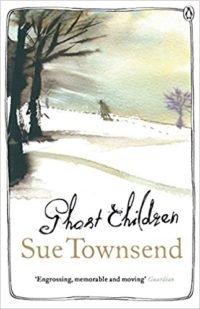The baby eyed him with a frozen watchfulness
 Ghost Children
Ghost Children
by Sue Townsend
Despite its author, this book is not a comedy. It is not remotely funny. It is a book fuelled by anger, which in retrospect was there in Townsend’s comedy too.
In some ways this is the book that My Name is Leon managed not to be; both look at unwanted or unplanned children, class, social services, neglect and adoption. Where Kit de Waal was all humanism and understanding, Sue Townsend is bleak and unforgiving. It’s a powerful, upsetting book railing against…life? Inequality?
The story follows Christopher Moore, a lonely middle-aged man who is still in love with his ex, Angela, who is now married to another man. 17 years earlier she had an abortion without telling him and it destroyed their relationship, but now he wants to hear the full story.
“He half ran with the dog in the direction of the heath, their breath floated before them. He was aware of the smell of the dried sweat on his body. It drifted up to him as he walked through the sterile landscape. The bushes were hung with silver webs… Christopher let the dog off the lead and broke off a twig from a hawthorn tree, bent it into an arch, and with great care lifted a frosted web from a bush. His grandfather had taught him how to do this. He would have liked to have demonstrated this skill to a child of his own.”
One day in a cafe Christopher offers to mind a toddler for an hour, and so we meet young Storme and her parents Crackle and Tamara. They fulfil every tabloid stereotype of “unsuitable parents”. Crackle is a small-time drug dealer, prone to violent outbursts. Tamara is little more than a child herself, too lazy or depressed to clean or leave their filthy flat. When Christopher takes care of Storme he is shocked by how thin and dirty she is.
I love Sue Townsend, but while she puts effort into demonstrating how Christopher became a sad lonely middle-aged man and how Angela became a sad overweight middle-aged woman, we don’t get any indication of how Crackle and Tamara got where they are – aside from their decision not to get an abortion. So is the moral simply to make abortion legal and accessible? But Crackle and Tamara claim to love Storme and show no sign of not having wanted to keep her. However bad they have turned out to be at parenting, they show no awareness of it.
“The baby looked a hundred years old: its hair and skin looked dessicated. There were no plump folds around its wrists. It was a sharp-angled baby. When Crackle came back and sat down at the table the baby eyed him with a frozen watchfulness that reminded Christopher of his dog, after punishment.”
Another key difference between this book and My Name is Leon is that there is no sign of social services until late in this narrative, while de Waal puts them front and centre. They’re not perfect, but they are an important part of the story.
Of course, there are still children who slip through the cracks, who don’t get help as soon as they should. And there are people who are horrible, awful, abusive parents. But they are still people with background stories that might possibly illuminate my perspective of the world.
I don’t think this is a bad book at all. I enjoyed reading it. I guess I just prefer an attempt at understanding over pure anger.
First published 1997 by Methuen.
Source: Christmas present from my sister.